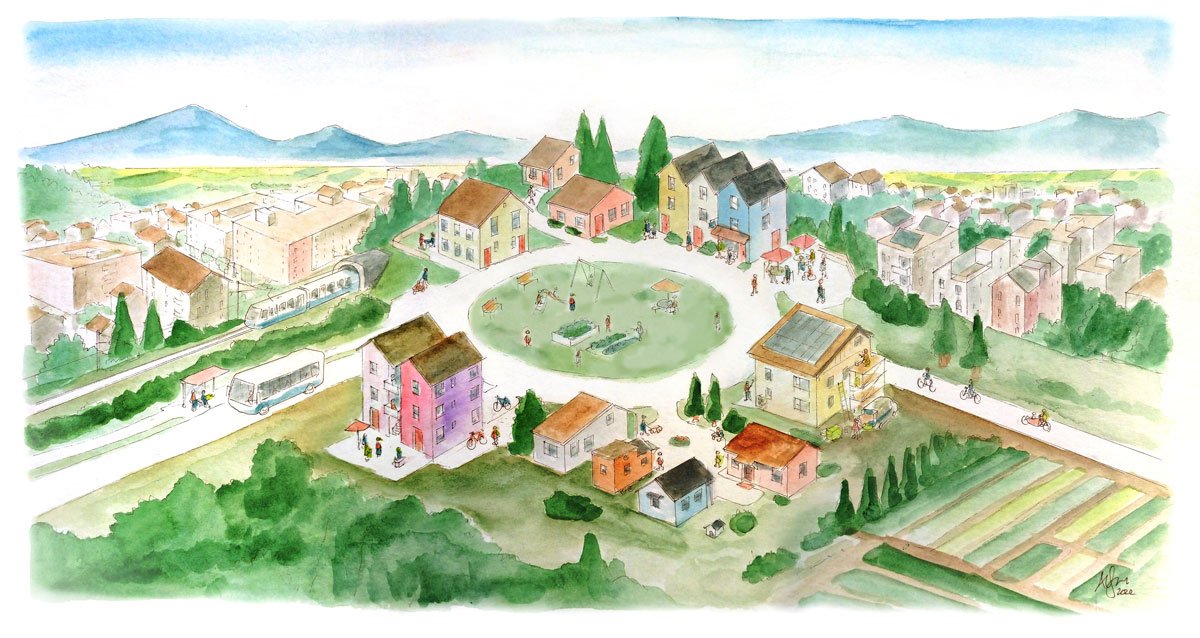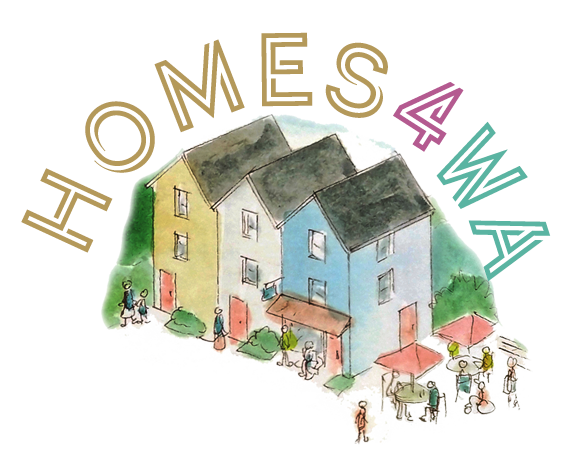
Washington’s housing shortage is hitting home in communities across the state. Not enough homes forces competition and drives up costs. We see it in bidding wars, waitlists, and high rent in our big job centers, mid-sized cities, and small towns. The result is that too many Washingtonians are facing housing insecurity, economic displacement, and homelessness. High rents and home prices are forcing people in our communities farther out—to longer, costlier commutes. And without adequate, affordable home choices near jobs, transit, schools, and services, our cities and towns are seeing accelerated sprawl, habitat loss, and climate pollution.
Homes4WA campaign partners are working together to advance state-level policy solutions in three mutually reinforcing areas:
STABILITY: More protections. Providing more assistance and stronger safeguards to keep people in their homes, protect renters from discrimination and eviction, support the unhoused, and protect Washington’s housing-insecure residents from homelessness.
SUPPLY: More choices. Lift restrictions and ease cost and delays so Washington cities and towns can add more homes, in all shapes and sizes. This will help more people access affordable and abundant housing, especially in communities and neighborhoods where jobs, services, and transit are plentiful.
SUBSIDY: More funding. Increase our state’s investments in permanently affordable housing, opening doors to homeownership and generational wealth-building, and protecting historically marginalized communities.
Recent Wins
“2023 was the Year of Housing,” posted Lieutenant Governor Denny Heck in April of that year. And indeed, with backing from a broad range of organizations and civic groups, the legislature passed a sweeping suite of bills to unlock more homes, in all shapes and sizes, across Washington. They followed up in 2024’s short session with important complements to those 2023 wins, plus a best-in-the-US policy for co-living homes.
-
HB 1110 (2023): Legalizes fourplexes or duplexes in most communities
Officials estimated that HB1110 will yield an additional 75,000 to 150,000 homes over the next 20 to 30 years in the Puget Sound region, which is home to about two-thirds of the state’s population. Scaled up on a per capita basis for the entire state, the midpoint of that estimate is an average of 6,700 homes per year statewide.
HB 1337 (2023): Legalizes two accessory dwelling units (aka backyard cottages) per lot and lifts numerous restrictions
Washington’s passage of HB 1337 puts it at the top of the heap for the best statewide accessory dwelling units (ADU) policies in the United States (they’re also known as “backyard cottages” and “bonus homes”).
HB 1042 (2023): Legalizes adding housing to existing buildings
This bill facilitates adding housing within the envelope of existing multifamily buildings by exempting the added units from parking mandates, density limits, and other regulatory barriers. It enables a commonsense solution for creating more homes relatively quickly and with minimal impact on the surrounding community.
SB 5491 (2023): Develops code for sunlight suites apartments (aka single-stair/elevator)
This bill requires the State Building Code Council to develop recommendations for raising the allowed height of sunlight suites apartment buildings—i.e., with a single stairway (or elevator)—to six stories and to adopt those changes by 2026. Sunlight suites’ flexible footprint allows these mid-height buildings to fit well on small urban infill lots, and single-stair floorplans also allow for better light and ventilation because each apartment has an exterior wall, with windows, on the front and back.
HB 1998 (2024): Legalizes co-living homes for convenient, community-centered, economical housing
Co-living offers low-cost, community-centered homes in some of the region’s most opportunity-rich neighborhoods. These smaller spaces with shared amenities, like kitchens, outdoor spaces, and lounges, make for high-value urban infill—economical home choices near jobs, transit, and services—while also offering comfortable, close-in, affordable home options for a diversity of residents: a recent college graduate; a single, early-career professional; an single senior who wants to downsize and stay in their neighborhood; newlyweds saving up to buy a first home. Local zoning largely bans co-living in Washington’s cities, and state legislation could legalize these much-needed housing options.
HB 2071 (2024): Cost-saving code adjustments for housing of up to six units
HB 2071 sets in motion a process to modify the residential building codes so that it can apply to the construction of middle housing projects up to six units. It’s a critical cost-saving follow-up to 2023’s HB 1110 that legalized middle housing.
-
SB 5412 (2023): Prevents abuse of environmental review that blocks housing
HB 5412 exempts from State Environmental Policy Act (SEPA) review proposed housing developments within urban growth areas that comply with local Comprehensive Plans. SEPA review has become largely redundant with local regulations and adds cost and delay to homebuilding. Worse, it makes it easy for activists to abuse SEPA to block housing through legal appeals.
SB 5290 (2023): Helps cities streamline permitting
SB 5290 establishes grant programs for local governments to reduce permit review timelines and supports their transition from paper-based to software/web-based systems. Sightline analysis showed that for a typical six-story apartment building, every two months of delay adds development expense roughly equal to the cost of constructing one apartment.
SB 5258 (2023): Reduces regulatory barriers to condo construction
This measure modifies condo laws on construction defect actions and warranties, deposit requirements, and local government planning, and would exempt condo sales to first-time homebuyers from the real estate excise tax. For years, Washington has suffered from a dearth of condo construction, which has worsened the state’s shortage of lower-cost “starter home” ownership options.
SB 5058 (2023): Reduces barriers for small-scale condo construction
SB 5058 exempts projects of two stories, with up to 12 units, from building enclosure design and enclosure inspection requirements, both of which add excessive costs to small-scale condo developments.
SB 6015 (2024): Gives builders more flexibility in complying with local parking mandates
Blanket parking mandates make all kinds of housing more expensive and harder to tuck into existing city neighborhoods—especially for middle housing and accessory dwellings and for targeted usessuch as senior living facilities and low-income affordable housing. They often require more parking than residents need, and in places they don’t need more, thwarting homebuilding through prohibitive costs or because parking simply won’t fit on a site.
SB 6015 creates new statewide standards to give builders more flexibility in complying with local parking mandates. The first stand-alone parking bill ever passed in Washington, its reforms will make homebuilding easier and less expensive.
-
Saying yes to record-setting state funding for affordable housing
Washington’s 2023–25 Capital Budget allocates $570 million for affordable housing, including:
$400 million to the Housing Trust Fund (the highest amount ever),
$60 million to connect affordable housing developments to infrastructure,
$50 million for affordable transit-oriented housing, and
$40 million for land acquisition.
-
HB 1181 (2023): Recognizing infill housing abundance as a climate-smart growth tool
HB 1181 makes a broad set of changes to the Growth Management Act to address climate change, including a provision for local governments to legalize higher-density housing as a way to meet goals for reducing climate pollution.
Sightline Institute is the home-base organization for the Homes4WA campaign. We partner with a host of other state and local advocates and organizations who share a vision that all Washingtonians can enjoy stable, affordable homes in safe, healthy communities. To learn more, get involved, or add your organization to the campaign’s network, contact Homes4WA@sightline.org.



